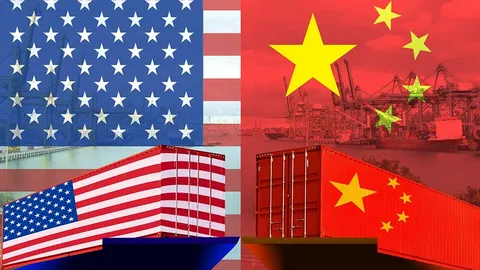Investors are holding their breaths as senior trade negotiations between China and the United States resume in Geneva, Switzerland, with a potential to decide the course of the global economy. With the two economic powers engaged in an intense tariff battle that has dislocated markets and unsettled world supply chains, any hint of progress—or of failure—has the potential to cause huge market movements. The uncertainty generated by retaliatory tariffs and diplomatic spats has already shaken investors sentiment, and now all eyes are on this pivotal round of talks that can either calm or continue to shake the world economy.
Read More: Fast-Track Status for Gulf Wealth Funds to Transform US Ties
Market Sentiment Swings as Talks Begin
In spite of months of escalating tension, there is a mood of tentative optimism gathering in financial circles. Investors are hoping that the Geneva summit could bring some respite or at least a lull in hostilities. The meeting follows a very aggressive act by US President Donald Trump, who imposed a blanket 145% tariff on Chinese imports. China retaliated with a 125% tariff on American products. These reprisals have effectively brought to a standstill $600 billion of annual trade between the two countries, sending ripples across global share markets and instilling investors anxiety.
Jo Cwonko, head of investment for Emerging Markets Americas at UBS, spoke to the gravity of these negotiations, calling them “the ultimate negotiation” and noting that it’s not merely tariffs on the line—it’s the entire framework of global trade and economic collaboration. Investors are walking on eggshells, aware that even slight developments from the talks could initiate profound changes in worldwide capital flows.
Volatility Peaks as Markets Await Direction
Wall Street has not escaped the heat of the ongoing trade war. The S&P 500 has fallen close to 8% since its February highs, with the damage done by the April tariff shockwaves. The Cboe Volatility Index, in the meantime, lingers at 22, a pretty clear sign that investor nerves are still on edge.
Although there have been temporary rallies—most recently after Trump signaled lowering tariffs to 80%—these have been fleeting. Investors are aware that words are not transactions. Accordingly, experts are recommending prudence, with many pursuing a “sell on strength” approach until more meaningful results come out of the Geneva talks.
The general sentiment in the marketplace is that although this round of negotiations may calm the waters, a grand settlement is highly improbable. The majority are hedging their bets as they monitor events minute by minute.
Also Read: Trade War Worsens China’s Deflation Crisis Amid Global Economic Strain
Economic Fallout on Both Sides of the Pacific
The financial cost is becoming more obvious with every passing month. In China, production output has decelerated, and a few sectors have halted operations entirely because of declining global demand. The US is experiencing its own problems, with retail, shipping, and even supermarket supply chains dealing with price jumps and possible shortages.
Compounding the anxiety of investors are conflicting cues from economic data. While American consumer spending and employment are stable, business optimism has fallen. Meanwhile, the Federal Reserve maintains its warning lights on “high uncertainty” reflecting international tensions. On the other side, concern over deflation is growing among China, weakened factory activity, and slowing internal consumption adding extra pressure on Beijing.
In a strategic gesture, China has increased trade with other areas, recording an 8% rise in exports to the European Union. This has not, however, been sufficient to counter the 21% drop in shipments to the US.
The Stakes in Geneva: Trade, Power, and the Future
Guided by US Treasury Secretary Scott Bessent, Trade Representative Jamieson Greer, and Chinese Vice Premier He Lifeng, the Geneva negotiations are not merely about tariffs—they are a test of economic might, diplomatic forbearance, and global influence. Trump has branded the negotiations a “total reset,” implying his administration is willing to consider new terms, but insiders warn that the issues are too complicated to be resolved overnight.
From intellectual property and supply chains to cybersecurity and tech dominance globally, the terms of the negotiation stretch far beyond what appears on the tariff sheet. Investors know this, which is why the financial community is expecting not a resolution, but hints that further escalation will be eschewed.
A Bloomberg Economics projection is cautioning that unless tariff policy changes, it could erase as much as 90% of US-China trade—equivalent to a devastating kick to two economies whose combined GDP stands at $46 trillion. Since China also owns $1.4 trillion worth of US portfolio assets, the resolution of these negotiations will reverberate far beyond Wall Street.
Even if Geneva fails to produce a signature achievement, investors will find solace in movement, no matter how small. A solid foundation to build on for future negotiations, some tariff easing, or enhanced diplomatic tone could be enough to stabilize markets and provide businesses with the certainty they so desperately need to look forward to. The globe is waiting—not only with hope, but also with high expectations and deep unease.
For More Trending Business News, Follow Us 10xtimes News






